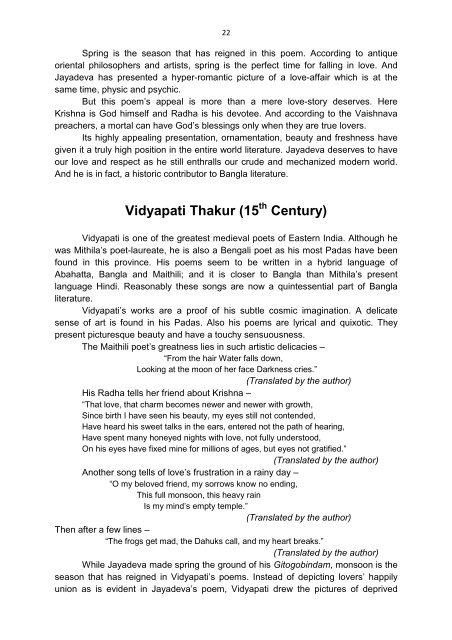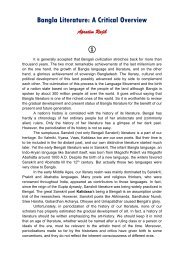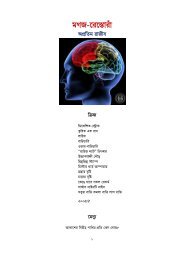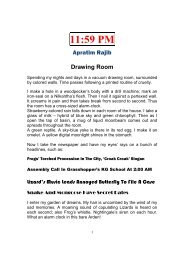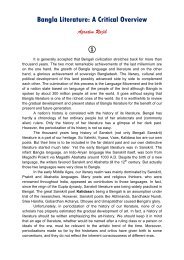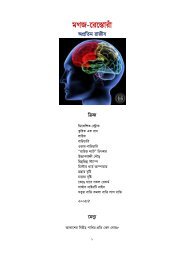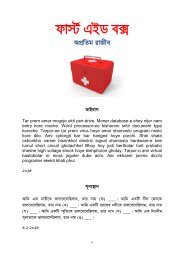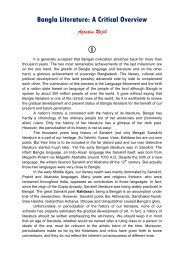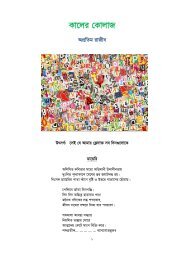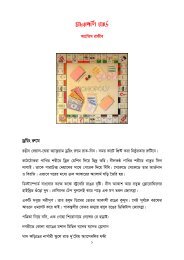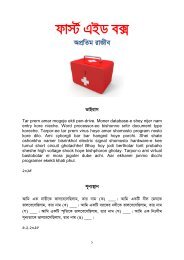BLiterature-Apratim
You also want an ePaper? Increase the reach of your titles
YUMPU automatically turns print PDFs into web optimized ePapers that Google loves.
22<br />
Spring is the season that has reigned in this poem. According to antique<br />
oriental philosophers and artists, spring is the perfect time for falling in love. And<br />
Jayadeva has presented a hyper-romantic picture of a love-affair which is at the<br />
same time, physic and psychic.<br />
But this poem’s appeal is more than a mere love-story deserves. Here<br />
Krishna is God himself and Radha is his devotee. And according to the Vaishnava<br />
preachers, a mortal can have God’s blessings only when they are true lovers.<br />
Its highly appealing presentation, ornamentation, beauty and freshness have<br />
given it a truly high position in the entire world literature. Jayadeva deserves to have<br />
our love and respect as he still enthralls our crude and mechanized modern world.<br />
And he is in fact, a historic contributor to Bangla literature.<br />
Vidyapati Thakur (15 th Century)<br />
Vidyapati is one of the greatest medieval poets of Eastern India. Although he<br />
was Mithila’s poet-laureate, he is also a Bengali poet as his most Padas have been<br />
found in this province. His poems seem to be written in a hybrid language of<br />
Abahatta, Bangla and Maithili; and it is closer to Bangla than Mithila’s present<br />
language Hindi. Reasonably these songs are now a quintessential part of Bangla<br />
literature.<br />
Vidyapati’s works are a proof of his subtle cosmic imagination. A delicate<br />
sense of art is found in his Padas. Also his poems are lyrical and quixotic. They<br />
present picturesque beauty and have a touchy sensuousness.<br />
The Maithili poet’s greatness lies in such artistic delicacies –<br />
“From the hair Water falls down,<br />
Looking at the moon of her face Darkness cries.”<br />
(Translated by the author)<br />
His Radha tells her friend about Krishna –<br />
“That love, that charm becomes newer and newer with growth,<br />
Since birth I have seen his beauty, my eyes still not contended,<br />
Have heard his sweet talks in the ears, entered not the path of hearing,<br />
Have spent many honeyed nights with love, not fully understood,<br />
On his eyes have fixed mine for millions of ages, but eyes not gratified.”<br />
(Translated by the author)<br />
Another song tells of love’s frustration in a rainy day –<br />
“O my beloved friend, my sorrows know no ending,<br />
This full monsoon, this heavy rain<br />
Is my mind’s empty temple.”<br />
(Translated by the author)<br />
Then after a few lines –<br />
“The frogs get mad, the Dahuks call, and my heart breaks.”<br />
(Translated by the author)<br />
While Jayadeva made spring the ground of his Gitogobindam, monsoon is the<br />
season that has reigned in Vidyapati’s poems. Instead of depicting lovers’ happily<br />
union as is evident in Jayadeva’s poem, Vidyapati drew the pictures of deprived


